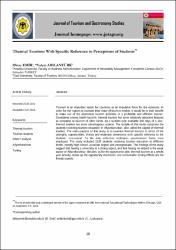Thermal Tourism: with Specific Reference to Perceptions of Students
Abstract
Tourism is an important sector for countries as an impulsive force for the economy. In order for the regions to increase their share of tourism market, it would be to their benefit to make use of the alternative tourism activities in a profitable and efficient manner. Considered among health tourism, thermal tourism has some relatively attractive features as compared to tourism of other kinds. As a tourism type available 365 days of a year, thermal tourism has some advantageous aspects. The sample of this study comprises the students receiving tourism education in Afyonkarahisar, also called the capital of thermal tourism. The main purpose of this study is to examine thermal tourism in terms of the strengths, opportunities, threats and weakness dimensions with specific reference to the students' assessment. As the data collection technique, questionnaire forms were employed. The study included 1135 students receiving tourism education at different levels; namely high school, associate degree and undergraduate. The findings of the study suggest that having a university is a strong aspect, and that having no airport is the weak aspect of Afyonkarahisar. Besides, as for the opportunity side, thermal tourism as a whole year activity makes up the opportunity dimension, and unfavorable zoning effects are the threats aspects. Tourism is an important sector for countries as an impulsive force for the economy. In order for the regions to increase their share of tourism market, it would be to their benefit to make use of the alternative tourism activities in a profitable and efficient manner. Considered among health tourism, thermal tourism has some relatively attractive features as compared to tourism of other kinds. As a tourism type available 365 days of a year, thermal tourism has some advantageous aspects. The sample of this study comprises the students receiving tourism education in Afyonkarahisar, also called the capital of thermal tourism. The main purpose of this study is to examine thermal tourism in terms of the strengths, opportunities, threats and weakness dimensions with specific reference to the students' assessment. As the data collection technique, questionnaire forms were employed. The study included 1135 students receiving tourism education at different levels; namely high school, associate degree and undergraduate. The findings of the study suggest that having a university is a strong aspect, and that having no airport is the weak aspect of Afyonkarahisar. Besides, as for the opportunity side, thermal tourism as a whole year activity makes up the opportunity dimension, and unfavorable zoning effects are the threats aspects.
Source
Journal of Tourism and Gastronomy StudiesVolume
3Issue
3URI
http://www.trdizin.gov.tr/publication/paper/detail/TVRreE9EQXdNQT09https://hdl.handle.net/11421/19641


















